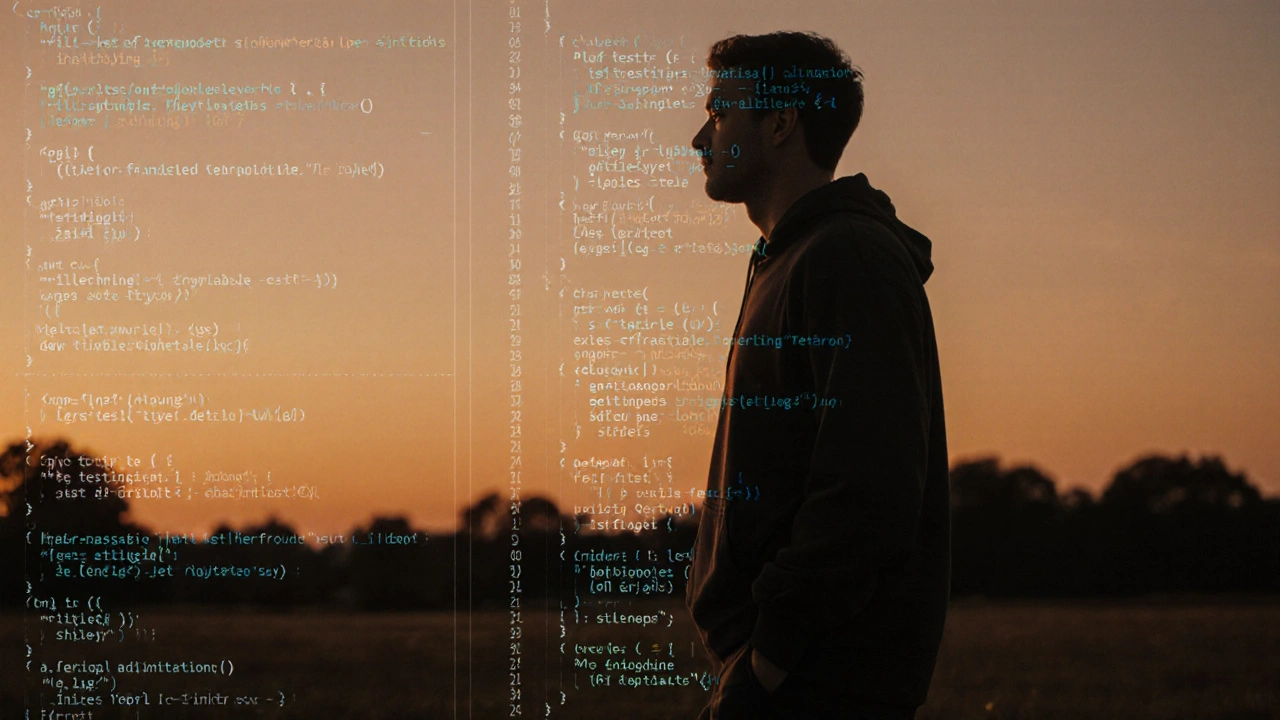Focus Timer & Productivity Tracker
Work Smarter, Not Harder
Based on the article's principle: The fastest developers work in 90-minute blocks. This timer helps you implement focused work sessions with built-in productivity insights.
Try taking a 10-minute walk after each session to reset your focus.
Ever feel like you’re coding for hours and still falling behind? You’re not lazy. You’re just using the wrong tools, habits, or mindset. The fastest developers aren’t the ones who type the most. They’re the ones who think the clearest, plan the smartest, and avoid the traps everyone else walks into.
Stop Typing, Start Thinking
Most beginners think speed means typing fast. That’s like thinking a race car wins because it has loud exhaust. The real win comes from knowing which turn to take, when to brake, and when to accelerate. Top developers spend 40% of their time thinking before they write a single line of code. They sketch diagrams on whiteboards, write down edge cases, and ask: "What’s the simplest way this could break?" A study from the University of Cambridge tracked 120 software teams over six months. Teams that spent more time planning upfront shipped features 30% faster and had 50% fewer bugs. That’s not magic. It’s avoiding rework. Try this: Before you open your editor, grab a notebook. Write down:- What problem are you solving?
- What inputs and outputs are expected?
- What could go wrong?
- What’s the bare minimum version that works?
Build Your Toolkit - Not Just Code
You wouldn’t fix a leaky pipe with a hammer. Yet so many developers try to write complex logic using only their keyboard and a browser console. The fastest developers have a toolkit. Not just languages - tools.- Code snippets: Use tools like VS Code’s Snippets or Dash for quick access to common patterns (API calls, error handlers, loops). You don’t type
fetch()five times a day - you trigger it with three keystrokes. - Terminal aliases: Instead of typing
cd /project/app && npm install && npm run dev, make an alias:alias startdev='cd /project/app && npm install && npm run dev'. Saves 20 seconds every time. That’s 10 minutes a day. - Debugger shortcuts: Learn how to set conditional breakpoints, step over vs step into, and watch variables. Most devs click through code line by line. That’s slow. Set a condition like
user.id === 482and let the debugger pause only when it matters. - AI pair programmers: GitHub Copilot isn’t writing your code for you - it’s giving you autocomplete on steroids. Use it to generate boilerplate, test cases, or docstrings. But never accept code you don’t understand. It’s a co-pilot, not a pilot.
Work in Small Bites - Not Marathon Sessions
The myth of the all-night coder is dangerous. Burning out doesn’t make you faster. It makes you slower. The fastest developers work in 90-minute blocks. They start with a clear goal: "Fix the login timeout bug." Not "Work on auth." They use the Pomodoro technique not because it’s trendy - because it’s backed by neuroscience. After 90 minutes, your brain hits a focus wall. Your attention drops. Mistakes rise. You start making silly typos or overlooking obvious logic errors. Here’s what they do:- Set a timer for 90 minutes.
- Work on ONE task. No Slack. No emails. No browsing.
- When the timer ends, walk away. Go outside. Stretch. Look at the sky.
- After two blocks, take a 30-minute break.

Read Code Like a Detective
You don’t get faster by writing more code. You get faster by reading more code - especially code you didn’t write. Open-source projects are goldmines. Look at how experienced devs structure their files. How do they name functions? Where do they put error handling? How do they test edge cases? Don’t just skim. Ask questions:- Why did they split this into two files instead of one?
- What’s the trade-off here? Speed? Maintainability?
- What would happen if this API returned null?
Test Early, Test Often - But Not Like a Robot
Testing isn’t a chore. It’s a shortcut. Most devs write tests after they’re done coding. That’s backwards. The fastest developers write tests while they’re coding - not to check if it works, but to think through what it should do. Write a failing test first. Then make it pass. That forces you to define the behavior before you implement it. It stops you from building the wrong thing. And don’t write 500-line test files. Write tiny, focused tests:- Does this function return the right value when given empty input?
- Does it throw an error when the user isn’t logged in?
- Does it handle a network timeout gracefully?

Know When to Walk Away
This is the secret no one talks about. Sometimes, the fastest way to finish a task is to stop working on it. You’ve been stuck on the same bug for three hours. You’ve tried everything. Your eyes are tired. Your brain is spinning. Walk away. Go for a walk. Make tea. Call a friend. Sleep on it. The next morning, you’ll see the problem clearly. Maybe it was a missing semicolon. Maybe it was a wrong variable name. Maybe it was a caching issue you didn’t even think to check. Your subconscious keeps working. Your brain doesn’t shut off just because you closed your laptop. The best developers don’t force it. They trust the process. They know that rest isn’t wasted time - it’s part of the code.What Stops You From Programming Faster?
Most people blame tools. Or their job. Or their team. But the real blockers are internal:- Perfectionism: Waiting for the "perfect" solution. The best code is the code that works now and gets improved later.
- Context switching: Jumping between Slack, GitHub, Jira, and email. Each switch costs up to 20 minutes of focus.
- Ignoring feedback: Not asking for code reviews. Not reading error logs. Not learning from past mistakes.
Can I really code faster without working longer hours?
Yes - and you should. The fastest developers work fewer hours, not more. They focus on eliminating waste: unnecessary meetings, repetitive tasks, unclear goals, and poor tooling. By working smarter - planning ahead, automating boring stuff, and taking breaks - they ship more in 6 hours than others do in 10.
Is using AI tools like GitHub Copilot cheating?
No. It’s like using a calculator instead of counting on your fingers. AI doesn’t replace thinking - it removes the grunt work. You still need to understand the logic, review the output, and test the result. Copilot writes the template; you write the meaning.
Why do I feel slower after switching to a new language or framework?
Because you’re learning a new way to think. Every language has its own patterns, idioms, and tools. You’re not slow - you’re rebuilding your mental models. Give yourself 3-6 months. Your speed will come back - and then grow beyond what you were before.
Should I write tests for every little function?
Not every one. But test the core logic - the parts that handle data, make decisions, or interact with the outside world. Skip tests for simple UI components that just display data. Focus on what breaks. What changes. What matters.
How do I stop getting distracted by Slack and emails?
Turn them off. Seriously. Use focus modes in your OS, block distracting sites with apps like Freedom or Cold Turkey, and set auto-replies during deep work blocks. Your team will survive without an instant reply. Your code won’t survive if you’re constantly interrupted.

